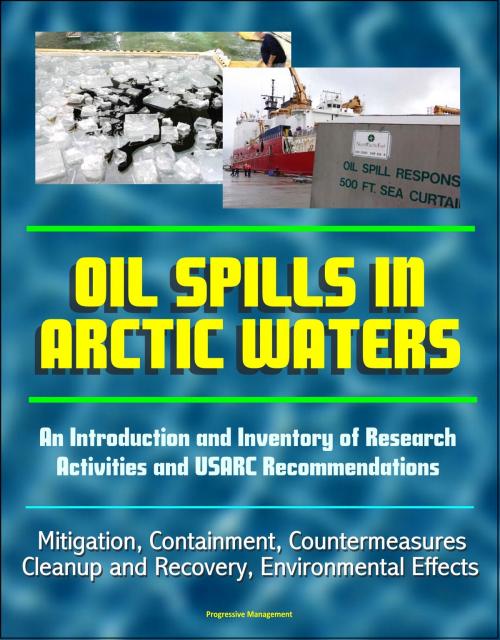Oil Spills in Arctic Waters: An Introduction and Inventory of Research Activities and USARC Recommendations - Mitigation, Containment, Countermeasures, Cleanup and Recovery, Environmental Effects
Nonfiction, History, Polar Regions, Science & Nature, Science, Biological Sciences, Ecology| Author: | Progressive Management | ISBN: | 9781311924346 |
| Publisher: | Progressive Management | Publication: | November 28, 2014 |
| Imprint: | Smashwords Edition | Language: | English |
| Author: | Progressive Management |
| ISBN: | 9781311924346 |
| Publisher: | Progressive Management |
| Publication: | November 28, 2014 |
| Imprint: | Smashwords Edition |
| Language: | English |
This "white paper" is a compilation of research on oil spills in ice-covered Arctic waters and recommendations for future work. We identify research entities in governmental, nongovernmental, industrial, and private organizations, and provide an inventory of research projects. Given that much work is currently in progress, we provide only a snapshot in time, and an introduction to the topic.
While an in-depth evaluation of the research results, a prioritization of research and development gaps, and a critical examination of the connection between research and oil spill response capability are undoubtedly important topics, they are beyond the scope of this effort. We hope that our foray into this subject encourages others to address these critical topics. Finally, the US Arctic Research Commission (USARC) closes this paper with recommendations for additional research on the topic of oil spills in ice-covered Arctic waters.
Introduction * Motivation * Outline * Scope * Funding * US Federal Research * Industry Research * Test Facilities * Inventory of Research Projects on Oil Spills in Arctic Waters * Prior Research Provides a Foundation * Funding of Oil Spill Research * FEDERAL ARCTIC MARINE OIL SPILL RESEARCH EFFORTS * Department of the Interior: MMS, BOEMRE, ONRR, BOEM, BSEE, USGS * Department of Commerce: NOAA * Department of Defense: USACE, USN * Department of Homeland Security: USCG * Other Federal Agencies * COORDINATION OF FEDERAL R&D EFFORTS * OTHER ARCTIC MARINE OIL SPILL R&D EFFORTS * Nonprofit Organizations * Industry (US and Non-US) * Canada * Private Consultants * Other Current Activities of Interest and Published R&D Plans * USARC RECOMMENDATIONS * Spill Delineation and Mitigation, Including Containment and Countermeasures * Oil Spill Response Technologies for Cleanup and Recovery of Oil * Data Management Tools Currently Being Developed, and the Fate of Oil and Its Effects on the Environment
First, because interest in oil and gas development in the Arctic is on the rise, as is marine shipping, the likelihood of oil spills is increasing. Climate change, the retreat of Arctic ice, and global economic demand suggest that oil and gas prospects will be explored and eventually developed on the outer continental shelf of Alaska and in remote, icy waters of other Arctic nations. Increased Arctic marine transportation, and greater oil and gas exploration and production, amplify the possibility of oil spills.
Prior exploration and limited development have occurred in this region, but recent spills in other areas, such as the Gulf of Mexico and the North Sea, have heightened awareness and concern regarding the adequacy of spill prevention and cleanup techniques in ice-infested waters, including those characterized by intact sea ice sheets, broken ice conditions, and slushy conditions.
Second, we attempt to address the basic question, "What research is being done to prevent or respond to oil spills in the Arctic?" As it turns out, several entities are engaged in this activity, including domestic and foreign governments (federal and state), industry, nonprofit organizations, and private consultants.
The third reason is timeliness. Royal Dutch Shell has demonstrated a long-term interest in the outer continental shelf of Alaska, and had planned, in summer 2012, substantial Arctic exploratory drilling operations on two lease holdings in the Beaufort and Chukchi Seas. Because of several challenges, including damage to a spill containment dome (aka "capping stack") during a testing accident, Shell decided, on September 17, 2012, to postpone deep (beyond 1400 feet) drilling in the Alaskan Arctic for at least a year.
This "white paper" is a compilation of research on oil spills in ice-covered Arctic waters and recommendations for future work. We identify research entities in governmental, nongovernmental, industrial, and private organizations, and provide an inventory of research projects. Given that much work is currently in progress, we provide only a snapshot in time, and an introduction to the topic.
While an in-depth evaluation of the research results, a prioritization of research and development gaps, and a critical examination of the connection between research and oil spill response capability are undoubtedly important topics, they are beyond the scope of this effort. We hope that our foray into this subject encourages others to address these critical topics. Finally, the US Arctic Research Commission (USARC) closes this paper with recommendations for additional research on the topic of oil spills in ice-covered Arctic waters.
Introduction * Motivation * Outline * Scope * Funding * US Federal Research * Industry Research * Test Facilities * Inventory of Research Projects on Oil Spills in Arctic Waters * Prior Research Provides a Foundation * Funding of Oil Spill Research * FEDERAL ARCTIC MARINE OIL SPILL RESEARCH EFFORTS * Department of the Interior: MMS, BOEMRE, ONRR, BOEM, BSEE, USGS * Department of Commerce: NOAA * Department of Defense: USACE, USN * Department of Homeland Security: USCG * Other Federal Agencies * COORDINATION OF FEDERAL R&D EFFORTS * OTHER ARCTIC MARINE OIL SPILL R&D EFFORTS * Nonprofit Organizations * Industry (US and Non-US) * Canada * Private Consultants * Other Current Activities of Interest and Published R&D Plans * USARC RECOMMENDATIONS * Spill Delineation and Mitigation, Including Containment and Countermeasures * Oil Spill Response Technologies for Cleanup and Recovery of Oil * Data Management Tools Currently Being Developed, and the Fate of Oil and Its Effects on the Environment
First, because interest in oil and gas development in the Arctic is on the rise, as is marine shipping, the likelihood of oil spills is increasing. Climate change, the retreat of Arctic ice, and global economic demand suggest that oil and gas prospects will be explored and eventually developed on the outer continental shelf of Alaska and in remote, icy waters of other Arctic nations. Increased Arctic marine transportation, and greater oil and gas exploration and production, amplify the possibility of oil spills.
Prior exploration and limited development have occurred in this region, but recent spills in other areas, such as the Gulf of Mexico and the North Sea, have heightened awareness and concern regarding the adequacy of spill prevention and cleanup techniques in ice-infested waters, including those characterized by intact sea ice sheets, broken ice conditions, and slushy conditions.
Second, we attempt to address the basic question, "What research is being done to prevent or respond to oil spills in the Arctic?" As it turns out, several entities are engaged in this activity, including domestic and foreign governments (federal and state), industry, nonprofit organizations, and private consultants.
The third reason is timeliness. Royal Dutch Shell has demonstrated a long-term interest in the outer continental shelf of Alaska, and had planned, in summer 2012, substantial Arctic exploratory drilling operations on two lease holdings in the Beaufort and Chukchi Seas. Because of several challenges, including damage to a spill containment dome (aka "capping stack") during a testing accident, Shell decided, on September 17, 2012, to postpone deep (beyond 1400 feet) drilling in the Alaskan Arctic for at least a year.















